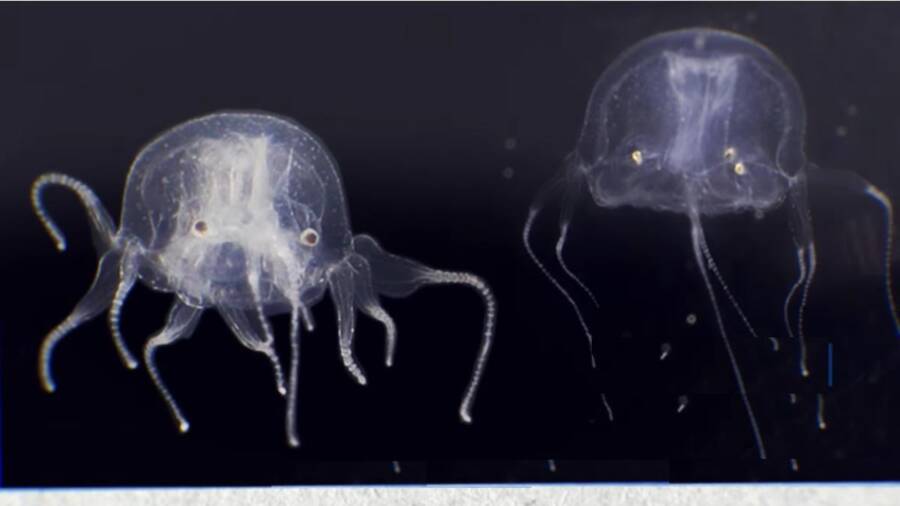Something really different and it is not surprising to see it is a jelly fish. we pretend that our oceans have been well searched for odd species and all that and it is far from the truth.
We need to understand that all such searches are a simple traverse and the slightest warning will put every thing into hiding mode.
I have walked my share of game trails and always saw nothing. Cameras today after dark show us serious traffic.
and this is making zero allowance for cover which must also protect both land and sea creatures. I suspect we rely on dumb luck.
This Newly Discovered Jellyfish Has 24 Eyes And Is Related To The World’s Most Venomous Creature
By Austin Harvey | Edited By Maggie Donahue
Published April 25, 2023
The new box jellyfish species was found in shrimp pools within the Mai Po Nature Reserve in Hong Kong.
https://allthatsinteresting.com/tripedalia-maipoensis-jellyfish?
HKBUThe newly discovered species, dubbed Tripedalia maipoensis, is related to the Australian box jellyfish, the world’s most venomous marine animal.
Researchers in Hong Kong recently discovered a new species of box jellyfish living in a brackish shrimp pond — the first-ever box jellyfish to be found in Chinese waters.
Named Tripedalia maipoensis after the Mai Po Nature Reserve in Hong Kong where the jellies were found, these small, cube-shaped jellyfish are completely transparent and colorless. Stemming from their bells, they have 12 tentacles that end in tiny, paddle-like structures, allowing them to travel more quickly through water than most other jellyfish.
The T. maipoensis also has 24 eyes arranged in clusters of six around its box-shaped bell.
“Two of them have lens for image formation, while the others can only sense the light,” Qiu Jianwen, a biology professor at Hong Kong Baptist University in charge of the research, said in a video posted to YouTube
. “Through comparing the morphology of the new species and the known species of box jellyfish… we confirmed that it is a new species.”
Like other box jellyfish, T. maipoensis has a venomous sting that can stun other creatures. In this case, researchers observed T. maipoensis stunning tiny shrimp known as Artemia, but it’s not clear if these tiny, half-inch jellyfish can sting humans as well.
“It seemed to paralyze Artemia offered in the lab,” Qiu told Live Science
. “But we did not touch the animal to feel the sting.”
Qiu and colleagues first observed the box jellies while analyzing samples from a “gei wai” — an intertidal shrimp pond — collected between 2020 and 2022. According to Qiu, the jellyfish were “quite abundant” with “up to 400 individuals in an area of the pond.”
Their research was published in the journal Zoological Studies on March 20, 2023.
“Although the box jellyfish family Tripedaliidae has been widely reported from tropical and subtropical waters, this is the first record of it in Chinese coastal waters,” they wrote in the study. “Future investigations along Chinese coasts are warranted to improve our understanding of the distribution of this new species and the diversity of Cubozoa.”

HKBU/YoutubeT. maipoensis is just the third known member of a group of box jellyfish, Tripedalia, with paddle-like structures at the ends of their tentacles.
The newly discovered species is also a cousin of the Australian box jellyfish, the world’s most venomous marine animal. Like T. maipoensis, the Australian box jellyfish, Chironex fleckeri, has a series of eyes around its cubic bell and can propel itself rapidly through the water. The Australian box jellyfish, however, is much larger than T. maipoensis.
With tentacles growing to an astonishing 10 feet long, the box jellyfish has a sting that can be fatal to humans. In many cases, these toxins can shut down a victim’s nervous system within minutes. Often, the victim drowns before they make it to shore. Humans who manage to survive a box jellyfish’s sting typically have permanent scars where they were stung.
This deadly sting has earned box jellyfish the nickname “sea wasp.”
These massive, deadly box jellyfish are typically only found in coastal waters off Northern Australia and the Indo-Pacific — but not in Chinese waters.
“We are thrilled by this discovery,” Qiu said in the video. “Finding a new species in Mai Po, where extensive research has been conducted, highlights the potential for more marine life discovery in the Hong Kong and even the Chinese coastal waters.”

No comments:
Post a Comment